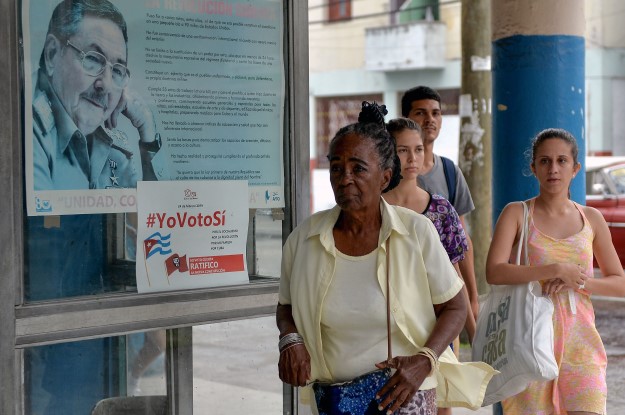This piece has been updated.
In a rare trip to the polls on Feb. 24, Cubans voted overwhelmingly to approve the most significant overhaul of its constitution in over four decades. The reforms, which include the recognition of private property and foreign investment, suggest a new era for the communist island. But the constitution’s update may be more about maintaining the status quo than a dramatic reform to Cuba’s political system, experts warn.
For his part, Cuban President Miguel Díaz-Canel has been clear that the revised constitution, approved in December by the National Assembly, is not a step toward an economic or political opening. “It reaffirms the socialist path of the country” and “reinforces institutionality,” Díaz-Canel said.
While the new version of the constitution recognizes private property and foreign investment, both remain regulated by and subordinate to the Cuban government, which ultimately controls the economy. The reforms, after all, were drafted by a commission led by former president Raúl Castro himself.
“Most of the document in fact ratifies the current form of government and reaffirms the dominant character of the communist party as the only legalized party,” Jorge Duany, director of the Cuban Research Institute at Florida International University, told AQ.
Other experts AQ spoke with suggest the constitutional changes are a way of preventing a larger economic collapse that might imperil the communist government’s hold on power. Raúl Castro’s government had already legalized private property in 2010 when it introduced a series of market reforms aimed at alleviating Cuba’s decades-long economic crisis, which was only exacerbated by falling imports from crisis-stricken Venezuela. Commercial exchange between both countries decreased from about $8.5 billion in 2012 to $2.2 billion in 2017, according to the National Office of Statistics of Cuba. This, alongside a bruised partnership with Brazil, the reintroduction of sanctions from the Trump administration and hurricanes put the one-party government in a tight spot that made some of the changes outlined in the new constitution necessary.
“They (the Cuban government) are changing because they are under enormous pressure,” Peter Hakim, president emeritus and a senior fellow at the Inter-American Dialogue, told AQ. “They know that without changing the economic rules of the game there is very little possibility of sustaining anything like a socialist, communist system.”
One way Cuba has done this has been by allowing the possibility of self-employment through small businesses, ranging from bed and breakfasts to tourist shops. However, the government keeps these businesses from thriving with high employment taxes and a lack of guarantees, said Carmelo Mesa-Lago, a professor emeritus of economics and Latin American studies at the University of Pittsburgh who edited a book about Cuba’s non-state sector.
“The government doesn’t want autonomous businesses to get rich because they think economic power leads to political power,” Mesa-Lago told AQ. “That is something that could threaten the government.”
Cuban Foreign Minister Rodrigo Malmierca Díaz has stated that “foreign investment for Cuba is a necessity,” and for years now Cuba has put forward efforts to attract companies from overseas with initiatives like the Mariel Special Development Zone, where special laws allow for 100 percent foreign ownership.
Malmierca has acknowledged that Cuba’s efforts to increase foreign investment have not met initial expectations from Cuba’s 2014 law to improve investment security. The inclusion in the new constitution of the importance of foreign investment, similar to the recognition of private property, mirrors an ongoing effort by the communist party to stay afloat amid the economic crisis.
Still, while the constitution in itself does not sufficiently protect foreign and domestic companies, the changes in the document are still significant, said Jorge Domínguez, a leading former scholar in Latin American studies at Harvard.
“I don’t want to exaggerate the impact of formalizing what has been in practice for years. It is merely about formalization,” Domínguez told AQ. “But formalization is not a silly activity.”
The restructuring of the Cuban state at the executive level in the new constitution could also bring more significant reforms to the way the government works, Domínguez said. Whereas in the past executive power resided in only the ‘Head of the Council State’ also known as the president, there will now be a Head of the Assembly and a Prime Minister — the new constitution’s “biggest change,” said Domínguez.
“The thing that the new constitution does that hasn’t been done before is a breakup of the ‘uni-personal’ power at the top,” Domínguez told AQ. “We don’t know how that is going to work, they don’t know how that is going to work, but it mandates a political process. This had never happened before.”
The roles of Prime Minister and Head of the Assembly will still be filled from within the Communist party, and this is only a small step towards a less centralized and less authoritarian form of government, said Roberto Veiga, lawyer and founder of Cuba Posible, a civil society project and platform for political dialogue and analysis in Cuba.
“Even in the most optimistic and hasty version of this walk, it will be a difficult path.”
This piece was updated to note that the new constitution was approved by voters.
—
Uriegas is an editorial intern for AQ.







